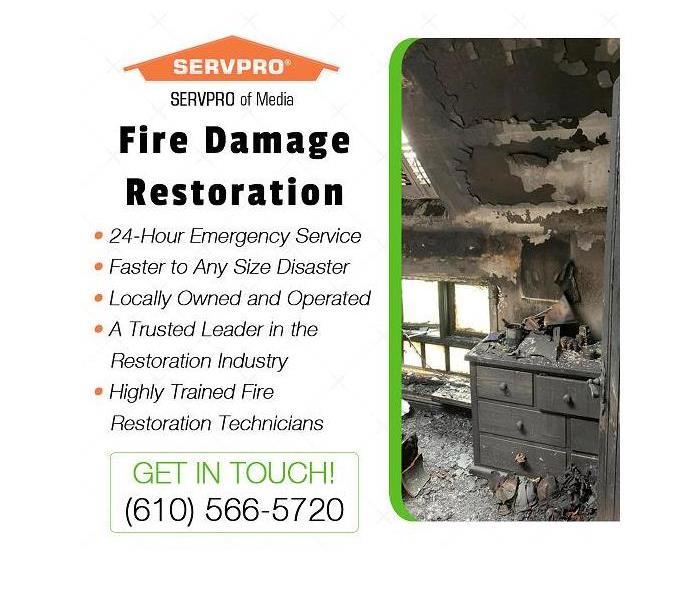How Practicing Proper Electrical Safety Can Help Homeowners Avoid a Fire Damage Disaster
7/13/2021 (Permalink)
Blog Summary: SERVPRO of Media is highlighting electrical safety tips to equip homeowners to prevent fire damage in their homes.
The fire damage restoration experts at SERVPRO of Media understand the close connection between electricity and fire safety in the home. Electrical outlets, plugs, power strips, and extension cords are a part of everyday life. With many more people working from home or engaging in virtual education, extension cords and power strips have multiplied around the home, increasing the strain on the home’s electrical system. Outlets, switches, appliances, and other electrical devices are undergoing a heavy workload.
How important is electrical safety?
According to a source in the insurance industry, this matter is crucial since fire departments respond to over ninety fires a day caused by electrical issues. “Electrical safety involving outlets, plugs, and extension cords is one of the most important home safety issues. U.S. fire departments respond to an average of 34,000 structure fires a year involving an electrical fire or malfunction…”
The homeowner now has access to many safe electrical choices ranging from tamper-resistant outlets to GFCI (Ground Fault Current Interrupter) receptacles. By incorporating these options into the home electrical system, the homeowner can reduce or eliminate electrical hazards that could potentially cause fire damage. Consider these safety tips when using electrical outlets, electrical cords, and extension cords.
Safety tips for electrical outlets
- Avoid a “hot unplug” by turning off appliances before unplugging them. A “hot unplug” can cause an arc inside the outlet. This arc has the potential to cause a fire.
- Upgrade outdated two-pronged outlets to three-pronged outlets. Enlist the services of a certified electrician for this upgrade.
- Make outlets safe for children. Replace standard receptacles with child-safe tamper-resistant receptacles in outlets located where children are present.
- Before using a new appliance, read the manufacturer’s instructions. Follow all instructions before inserting the plug into the outlet.
- Toasters, coffee makers, and hair dryers are examples of heat-producing appliances that use a large amount of wattage when in operation. Only one of these items should be plugged into a receptacle outlet at a time. Following this tip will ensure that the circuit is not overloaded.
- As a rule of thumb, plug only one high-wattage appliance or device into an outlet at a time. Examples would include a microwave, AC window unit, dehumidifier, blender, food processor, or power tool.
- Install ground-fault circuit interrupters (GFCIs) to prevent electrical shock hazards. The rooms that need GFCI outlets the most are the kitchen, bathroom, laundry room, basement, garage, and outdoor areas such as an outdoor kitchen or workbench. Any location where electrical equipment is exposed to moisture or can get wet is a prime location for a GFCI outlet. GFCI capabilities can be installed in the electrical system. Some power cords have GFCI capabilities to prevent shocks. This shock-prevention technology has saved many lives.
- Have a certified electrician install arc-fault circuit interrupters (AFCIs). This technology protects against arcing and sparking fire hazards caused by problems in home wiring.
Safety tips for extension cords
Extension cords make life in the home much easier; however, damaged extension cords pose a serious fire risk. Remember, extension cords are intended to be a temporary solution. Additional circuits or outlets can eliminate the need for extension cords. Here are some additional power cord safety tips.
- Damaged electrical cords are a shock and fire hazard. Damaged electrical cords should be immediately replaced or repaired. Do not use the cord until it is replaced or repaired.
- Avoid running extension cords under carpeting or throw rugs.
- Major appliances such as a window AC, microwave, or portable dishwasher should not be used with an extension cord.
- Never place towels, wet rags, clothing, wet gloves, or anything that can catch fire over a heat-producing appliance.
- Convert to LED light bulbs. These bulbs last up to 15,000 hours, use 80% less energy than standard light bulbs, and operate at a much lower temperature.
Consult a qualified electrician if any of the following situations are discovered:
- Circuits trip or fuses blow on a regular basis
- Outlets or switches feel warm
- Appliances give off a burning smell
- Lights flicker, grow dim or get bright without cause
- Lightbulbs seem to burn out too frequently
- Appliances arc and spark
In case of a fire damage disaster, trust the professionals at SERVPRO of Media to handle the fire damage restoration process from the initial call to the completion of the project, including the management of the insurance claims process. For more information about fire damage restoration in Newtown Square, PA, call SERVPRO of Media at (610) 566-5720 or email office@SERVPROmedia.com.






 24/7 Emergency Service
24/7 Emergency Service
